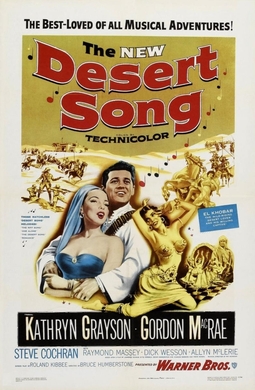Top Qs
Timeline
Chat
Perspective
The Desert Song (1953 film)
1953 film by H. Bruce Humberstone From Wikipedia, the free encyclopedia
Remove ads
The Desert Song is a 1953 film version in Technicolor of Sigmund Romberg's operetta. It is the third film version of the operetta, the third made by Warner Bros., and the second in full three-strip Technicolor. Although it was released in 1953, it was not made in widescreen; at that time Twentieth-Century Fox held the rights to Cinemascope, which was introduced that year in the film The Robe.
Remove ads
Plot
Summarize
Perspective
The original plot is more-or-less adhered to, with some significant alterations. Benny is depicted as a comic Bob Hope-like coward, but not as a sissy. El Khobar's alter ego is that of a mild-mannered (but not squeamish) Latin tutor and anthropologist, whom Birabeau (Ray Collins) hires to keep Margot (Kathryn Grayson) from flirting with his regiment.
The conclusion to the film is slightly different, since El Khobar (Gordon MacRae) is not Birabeau's son here. After the final battle, the General's soldiers realize that El Khobar and the Riffs were actually on their side and helped in preventing an uprising. When one asks, "And where is El Khobar?", MacRae, as the professor, enters carrying El Khobar's clothes, and quietly announces "El Khobar is dead". Margot is grief-stricken, but Birabeau, suspecting the truth, mischievously says that they can all be grateful to "the ghost of El Khobar", winking as he says this. As soon as they are alone, MacRae begins to sing the song One Alone to Margot, making her realize that her boring Latin tutor and the dashing El Khobar are one and the same. She rushes into his arms.[2]
One song not by Romberg, "Gay Parisienne", written for the 1943 film version of the show, was retained for this film.
Remove ads
Cast
- Kathryn Grayson (soprano) as Margot Birabeau
- Gordon MacRae (baritone) as Paul Bonnard / El Khobar, the dashing outlaw leader
- Steve Cochran as Captain Claud Fontaine (El Khobar's rival for Margot's affections)
- Raymond Massey as Sheik Youseff (the villain)
- Dick Wesson as Benjamin 'Benjy' Kidd
- Allyn McLerie as Azuri, an Arabian dancing girl
- Ray Collins as General Birabeau (here depicted as Margot's father, rather than the hero's father)
- Paul Picerni as Hassan (El Khobar's second-in-command)
- Frank DeKova as Mindar
- William Conrad as Lachmed
- Trevor Bardette as Neri
- Mark Dana as Lt. Duvalle
Remove ads
Music
The film features about eight numbers from the original score, but all of the songs (unlike those in the stage version), are given to either MacRae or Grayson (or both), or the chorus.[3]
- Overture
- The Riff Song - El Khobar, Riffs
- Romance - Margot
- The Desert Song - Paul
- Gay Parisienne - Margot, soldiers
- * Azuri's Dance - Azuri, women's dance ensemble
- One Flower Grows Alone In Your Garden - Margot
- One Alone - El Khobar, Margot
- The Desert Song (reprise) - El Khobar, Margot
- Long Live the Night - Margot
- One Alone (reprise) - Paul, Margot
- The Riff Song (reprise) - Riffs (sung over the end credits)
References
External links
Wikiwand - on
Seamless Wikipedia browsing. On steroids.
Remove ads

